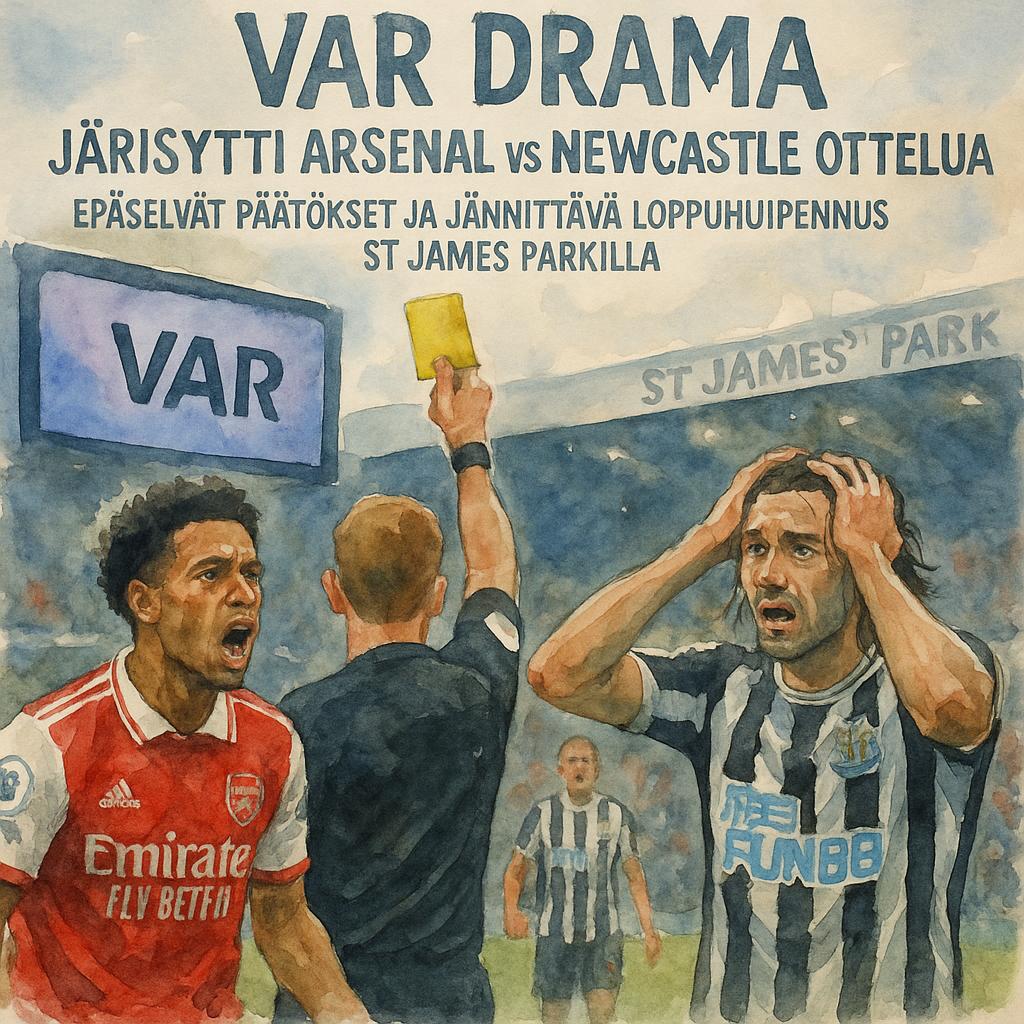VAR draama järisytti Arsenal vs Newcastle ottelua – epäselvät päätökset ja jännittävä loppuhuipennus St James Parkilla
There are nights in football that remind you it’s never just a game. It’s theatre, courtroom, and battleground all rolled into one. Sunday at St. James’ Park was exactly that — a night when the spotlight shifted from the players to the technology that’s supposed to make the sport fairer. Instead, it left fans arguing long after the final whistle.
The Penalty That Wasn’t
In the 14th minute, Arsenal’s Viktor Gyökeres sliced into Newcastle’s penalty area with purpose. Nick Pope, Newcastle’s goalkeeper, launched himself forward to meet him — a clash that seemed absolutely inevitable. Referee Jarred Gillett didn’t take long to decide: whistle blown, penalty awarded. Arsenal supporters erupted. Newcastle fans groaned. Case closed… or so it seemed.
Enter VAR. The big screens flickered, fans held their breath, and after a silent eternity the penalty was cancelled. Why? Pope had brushed the ball before crashing into Gyökeres. A fleeting toe on leather was enough to wipe away Arsenal’s chance. The stadium’s roar split down the middle — half seething, half relieved.
A Veteran Referee’s Fury
Mark Halsey, the former top-flight referee, was quick to weigh in. Having lived the loneliness of split-second calls, he wasn’t impressed. Writing after the match, Halsey argued Pope’s touch shouldn’t erase the foul that followed. More crucially, he insisted VAR had broken its own sacred rule. It exists only to correct “clear and obvious errors”, and in his eyes this situation was anything but. Gillett’s original decision, he said, should have stood.
To highlight the inconsistency, Halsey pointed back to last season when William Saliba conceded a penalty despite clipping the ball first. Same scenario, opposite ruling. That, he warned, is where the damage lies — not in whether a decision is right or wrong, but in whether players and fans ever truly know what to expect.
The Curse of Inconsistency
Supporters hardly need experts to tell them what they already believe: consistency is what matters most. If identical challenges don’t earn identical calls, faith in fairness erodes. Once that faith fades, every whistle sparks suspicion, and matches risk feeling less like sport and more like courtroom drama.
The Game Marches On
The overturned penalty loomed over the rest of the contest. Arsenal players looked furious, Newcastle supporters sensed injustice of their own, and the air hung heavy with tension. That tension broke late. In the 84th minute, Mikel Merino brought Newcastle back to level terms, undoing Arsenal’s early superiority. Just when it seemed the debate over VAR would overshadow everything else, Gabriel rose in stoppage time, powering a header home and snatching victory for Arsenal. The away fans’ roar wasn’t just celebration — it was vindication.
The Bigger Question
As fans trickled out of St. James’ Park, one question lingered: do we want football decided by spotless technological precision, or do we accept the imperfections of human refereeing? Halsey’s answer was stark. VAR isn’t a flawless guardian of justice. It’s an unreliable safety net that often undermines the man with the whistle. If fans can’t trust decisions — whichever way they go — then the soul of the game is at risk.
Because football has always been about more than goals and results. It’s about trust — the sense that what unfolds on the pitch is authentic, fair, and honest. Without it, even the most dramatic last-gasp winner feels hollow.
About That Journalist Persona
Yes — creating a recurring journalist persona is a terrific idea. It gives your articles voice, personality, and continuity — the sort of qualities that make readers look forward to every piece. Imagine crafting a fictional but consistent writer with:
- A distinctive name and backstory (e.g., a football-obsessed former amateur player turned columnist).
- A recognizable style — perhaps witty, sharp, and emotional, or lyrical and poetic.
- Recurring quirks like metaphors, turns of phrase, or anecdotes.
- Signature themes, such as focusing on the humanity of the game rather than just the stats.
This way, every article, whether it’s about refereeing controversies, transfer sagas, or cultural aspects of football, feels as though it’s penned by a seasoned voice readers know and trust. Think of it as inventing your very own Finnish version of Sid Lowe or Simon Kuper. Done right, that “columnist” could anchor your whole sports coverage identity.
Do you want me to sketch out the first draft of this persona — complete with name, tone guidelines, and a couple of sample “mini columns” — so you’ve got a practical toolkit to start publishing under?
